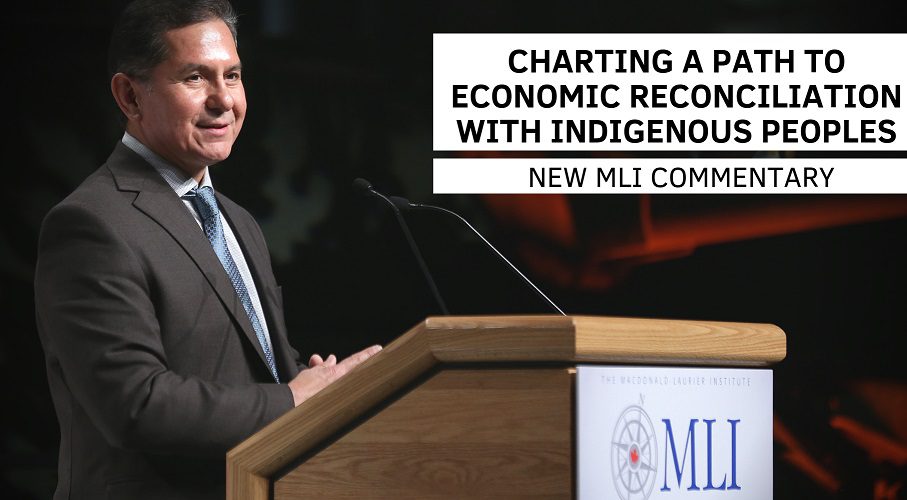 OTTAWA, ON (April 25, 2019) If Canadian policy-makers are serious about reconciliation, what should they be doing about it? To help answer this question, MLI has published a new commentary titled Charting a Path to Economic Reconciliation with Indigenous Peoples. This commentary sets out five concrete ideas to advance a real reconciliation agenda with Indigenous peoples.
OTTAWA, ON (April 25, 2019) If Canadian policy-makers are serious about reconciliation, what should they be doing about it? To help answer this question, MLI has published a new commentary titled Charting a Path to Economic Reconciliation with Indigenous Peoples. This commentary sets out five concrete ideas to advance a real reconciliation agenda with Indigenous peoples.
This publication is based on remarks from Blaine Favel during MLI’s 2019 Annual Dinner. Favel is an Indigenous business leader hailing from the Poundmaker Cree Nation and is a former Grand Chief of the Federation of Saskatchewan Indian Nations.
According to Favel, economic reconciliation starts with acknowledging a basic truth.
“Reconciliation means that Indigenous people should not be the poorest people in lands that belong to us.”
In his commentary, Favel makes the case that colonial practices regarding the economy and natural resources were “designed to keep First Nations separate, poor and out of sight.” Worse still, the legacy of these policies continues to negatively impact Indigenous peoples.
For Favel, governments in Canada are stuck in an inherently colonialist mindset when it comes to Indigenous economic opportunity. Rather than seeing First Nations as eager and willing partners, they are too often seen as a regulatory box to check.
This is especially true when it comes to governments’ rejection of Indigenous ownership over pipeline projects, which Favel argues is an approach that is “imbued with arrogance and obliviousness.”
“These answers were wrong then, are wrong now and this colonial mentality needs to change if Canada hopes to build national infrastructure and an economy without running a perpetual losing battle for Indigenous people.”
Too often, policy-makers make false assumptions about Indigenous priorities. In some cases, these assumptions are rooted in long-standing paternalistic attitudes towards Indigenous people. Favel also warns that many in the environmental movement are taking this to the extreme, attempting to speak on behalf of Indigenous people in order to advance their own agenda.
“The environmental movement has only its agenda in mind, not the protection of Indian people, the education of our people and development of jobs… I find the tactics of the environmental movement repulsive and the ‘eco-colonialism’ they advocate for only results in poverty for our people.”
Indigenous peoples have been historically limited in their access to economic opportunity. But Favel suggests that this trend may be reversing. With new opportunities in the natural resource economy, new successes in developing positive relationships between First Nations and the government, and new Indigenous leaders who are pushing hard for “economic space” for their communities, “the Indigenous economy is getting more sophisticated and complex.”
“In many locales in Canada, Indigenous business drives the local economy and is getting stronger,” says Favel. “This is a success despite the barriers placed in front of us, with Indigenous businesses heavily concentrated in the local resource sector, be it mining, energy or forestry.”
While critical of the status quo and the general antipathy with which successive governments have approached Indigenous affairs, Favel makes a number of recommendations that could inform future reconciliation efforts, including that:
- Development must be rooted in Indigenous connection to the land and jurisdiction over our territories;
- Indigenous people should be allowed to access the same sorts of capital for development as non-Indigenous people;
- The environmental movement’s involvement in Indigenous issues should be scrutinized, particularly when it comes to “eco-colonialism”;
- The structures, policies, funding, and regulatory processes associated with industry should be redesigned to align with rights and ambitions of Indigenous people; and
- A new relationship must be developed on the principle of lifting Indigenous people out of poverty through mutually beneficial development.
Despite problems, Favel remains fundamentally optimistic when it comes to reconciliation.
“I remain confident as a Canadian that we are practical and open hearted enough to realize when things are broken and out of date, and move on,” he explains.
“It is a mature, confident nation which can acknowledge its shortcomings and try to make it right.”
To learn more, read the full commentary paper here.
For more information media are invited to contact:
Brett Byers-Lane
Communications and Digital Media Manager
613-482-8327 x105
brett.byers-lane@macdonaldlaurier.ca




